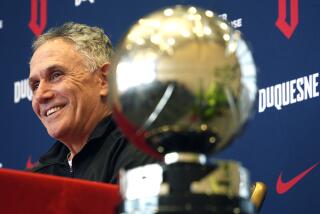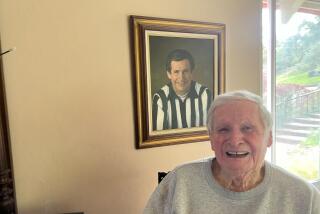All Things Considered, He Made Call to Play ’81 Game
- Share via
PHILADELPHIA — If you enter the keywords “Duke,” “NCAA tournament” and “Philadelphia” into your mental search engine, chances are the first thing that will turn up is the 1992 East Regional final in the Spectrum, where Duke’s Christian Laettner made a turnaround jump shot to beat Kentucky in what is considered the greatest tournament game ever played.
It’s an easy association to make, especially with Duke and Kentucky back in town for the East Regional this week.
There is another connection with those same words. Philadelphia was also the site of what might have been the most controversial tournament game ever played--controversial because it was played at all.
Twenty years ago, on March 30, 1981, President Reagan was shot. That night Indiana was supposed to play North Carolina in the Spectrum for the NCAA championship. The Academy of Motion Picture Arts and Sciences was supposed to hand out its coveted Oscars.
The Academy Awards were postponed for one night. The game went on. The man who ultimately made the decision to play was the NCAA Division I men’s basketball committee chairman.
His name: Wayne Duke.
If he were forced to make the same call again, Duke sounds as if he wouldn’t change.
“Considering all, we did the best job we could have done under the circumstances,” Duke said. “You had to be there to experience the pressures of all that’s before you.”
It was a highly anticipated game, featuring an Indiana team led by Isiah Thomas and a North Carolina squad featuring James Worthy, Al Wood and Sam Perkins. Indiana was returning to the same building where Coach Bob Knight won his first championship in 1976 (with what remains the last team to go undefeated in a season). It appeared to be the best chance for North Carolina Coach Dean Smith to win his first championship.
It also was going to be the final NCAA championship game for NBC. CBS held the tournament network broadcast rights beginning in 1982. And it was the final day Duke would be on the job. He was stepping down after 25 years of working in direct association with the tournament.
“I opened that day with a great sense of euphoria,” Duke said, which was usually the case for him on championship Monday. “This particular time, I had a great deal of nostalgia as well. That quite quickly turned morbid.”
When Duke entered the Spectrum with Tom Jernstedt, the assistant executive director of the tournament, they saw a news report on Reagan on a television monitor.
He turned to Jernstedt and said: “Tom, we may not be able to play this game. I’ve been here before.”
In 1963, Duke was the commissioner of the Big 8 Conference. He was 34 years old, the youngest commissioner in college sports. He thought he had a problem because that week the Orange Bowl had dropped its affiliation with the football champion of the Big 8. Then President Kennedy was shot and killed in Dallas.
The Oklahoma-Nebraska game was scheduled for that weekend. Oklahoma Coach Bud Wilkinson had served on the president’s national fitness council and knew Sen. Robert Kennedy. He somehow was able to get Robert Kennedy on the phone on the day of the assassination.
“Bobby Kennedy told us to go ahead and play the game,” Duke said.
With that endorsement, Nebraska and Oklahoma did play. The Cornhuskers won. Duke’s vindication came years later, when Wilkinson, the losing coach, told him he had made the right decision to play that weekend.
In 1981, Duke didn’t have as high-level clearance as he did from Kennedy’s brother. But he did hear from Dr. Ben Wilcox, the faculty athletic chairman of North Carolina who was in constant contact with Washington regarding Reagan’s health. Ultimately, that Reagan wasn’t in grave danger led Duke to decide in favor of playing.
That was also the last year of the third-place game between the two semifinal losers. The committee met at halftime of the runner-up game between Virginia and Louisiana State, then met again after the game.
“We had an unusual cadre of people whose input from various points of view contributed to our decisions,” Duke said. “This was not an individual’s decision. We had an unusual set of individuals, institutional and athletic people.”
Besides the prevailing question of sensitivity, they had to consider the logistics of getting the arena for another night. (The 76ers had a playoff game the next day). They had to wonder about the impact on television, which then was much more reluctant to rearrange its prime-time schedule for sporting events.
Among those consulted included Bill Friday, president of North Carolina; John Ryan, Indiana president; Bob James, Atlantic Coast Conference commissioner; and Dave Gavitt, athletic director at Providence.
But it was Duke who would have to face the media, Duke who would receive the blunt of the criticism from those who thought the games should have been postponed. The decision was announced 30 minutes before the scheduled tipoff.
“I can remember walking down the hallway to the pressroom,” Duke said. “It was the longest walk I ever took in my life.”
In his various jobs with the NCAA tournament and as commissioner of the Big 8 and Big Ten conferences, Duke dealt with everything from a chair-tossing coach (Duke suspended Bob Knight) to a death threat against a player in the Final Four (after informing both schools, the game was played without incident amid beefed-up security).
“The decision we made on the Reagan assassination [attempt] far transcended any of those things,” Duke said. “It probably created more pressure than anything than I’ve been involved in.”
He and Jernstedt had a ritual they had developed for that final Monday game.
“Before the start of the championship game, we look at each other and we shake hands,” Duke said.
“When we shook hands before the start of that game, we had tears in our eyes.”
Duke still can’t believe he was put in that situation twice. But the lessons from the Kennedy assassination colored his views on playing the game, which Indiana won, the night Reagan was shot. He still could hear the words of Bud Wilkinson.
“I think that’s what Bud was saying, that we owed it to people to get out of the doldrums,” Duke said. “It was an escape. Bud felt that we owed an escape to the country.
“Sports does provide an escape from normalcy.”
Later, Duke would hear what Reagan wrote to doctors in his hospital room 20 minutes after the game started. It was a quote from W.C. Fields: “All in all, I’d rather be in Philadelphia.”
*
J.A. Adande can be reached at [email protected].
More to Read
Go beyond the scoreboard
Get the latest on L.A.'s teams in the daily Sports Report newsletter.
You may occasionally receive promotional content from the Los Angeles Times.










